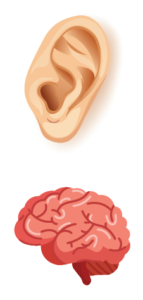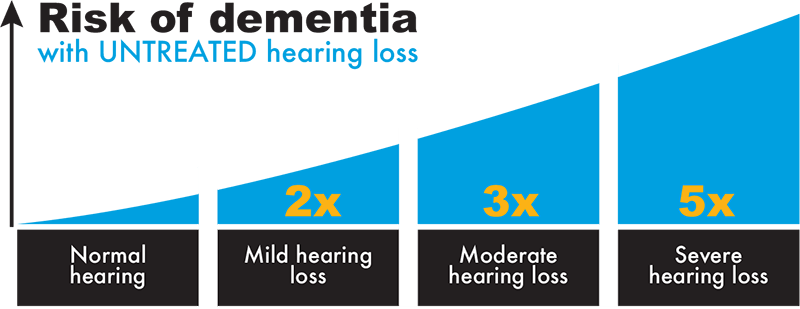Hearing and Cognition

Impact Hearing Loss has on Cognition
- Long-term hearing deprivation can impact cognitive performance
- Hearing loss places one at risk for cognitive impairment and increasing evidence has linked age-related hearing loss to more rapid progression of cognitive decline and incidental dementia
Cognition’s Impact on Hearing
- Limited cognitive skills from a variety of causes such as aging or head injury may reduce the cognitive resources available for understanding speech, especially in background noise, increasing the effects of hearing loss
- Hearing loss is associated with increased cognitive load due to the increased listening effort, or challenge of interpreting a degraded peripheral signal (speech)
Untreated hearing loss has been linked to an increased risk of cognitive decline and even dementia

If you have hearing loss, you may notice that at the dinner table or in group settings you are asking others to re- peat. When you ask, “What was that?”, or “Huh?” for the third time at a sitting, you may find that around the fourth time, you are getting frustrated, your friend/family member is also getting frustrated, and you may feel a little em- barrassed to ask for clarification AGAIN. When this becomes the pattern, you may find that you start “giving up” slowly by just nodding your head when you misunderstand, or sitting back and disengaging from the conversation instead of continuing to ask “What was that?”. As this scenario becomes one’s experience in dinner/group settings, you may start accepting less invitations as your experiences have slowly become less enjoyable.This is exactly the path we DO NOT want you to go down as you get older. If your hearing loss is left untreated, studies have shown that hearing loss can lead to a change in social interactions and a higher likelihood of depression (Li et al., 2014;Thomas et al, 2001; Weinstein & Ventry, 1982) as well as asso- ciations between hearing loss and cognitive decline (Lin et al, 2011; Lin et al 2013; Uhlmann et al, 1989). Research has also linked hearing loss to a higher risk of dementia, which increases as the severity of untreated hearing loss increases (Amieva and Colleagues, 2015). However, studies have also shown that consistent hearing aid use
can reduce your risk for cognitive decline.
As you age, we want to help you stay connected to the friends & family in your life and continue to participate in the activities that you enjoy.
Hearing is a HUGE part of this equation. We are “hear” to help optimize your hearing so that you can live the life you want to live today, tomorrow, and as you age healthfully!
